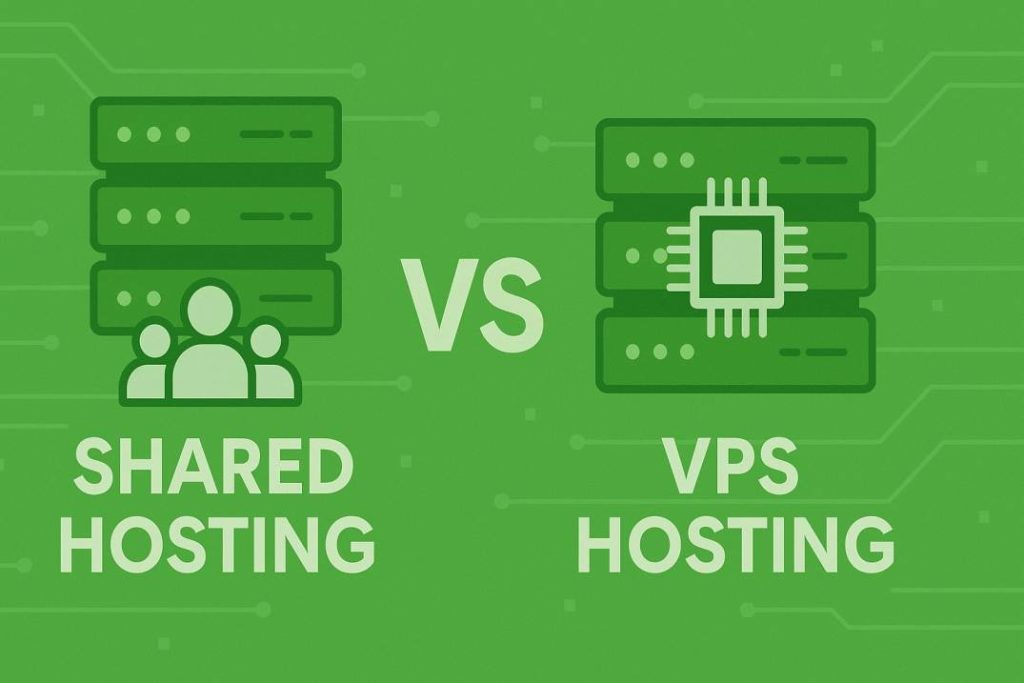Shared vs. VPS Hosting: What’s the Best Fit for Your Project?
When launching a new website or upgrading an existing one, choosing the right hosting plan is a critical decision. The two most popular options for individuals and businesses are Shared Hosting and VPS (Virtual Private Server) Hosting. While both provide the infrastructure to get your website online, they differ significantly in performance, control, scalability, and cost.

What Is Shared Hosting?
Shared hosting is the most basic and budget-friendly form of web hosting. As the name suggests, your website shares a single physical server with many other websites. Resources such as RAM, CPU, and disk space are shared among all users on that server.
Pros of Shared Hosting:
- Affordable: Low monthly fees, ideal for beginners and small websites.
- Easy to Use: Comes with user-friendly control panels and one-click installers.
- Maintenance-Free: The provider handles server security, updates, and backups.
Cons of Shared Hosting:
- Limited Resources: Shared bandwidth and storage can cause slowdowns.
- Lower Performance: Spikes in traffic from other users can impact your site.
- Less Control: Limited customization and fewer technical options.
What Is VPS Hosting?
VPS Hosting gives you a virtualized private space on a server, mimicking the experience of having your own dedicated server. Although you still share the physical machine, each VPS is allocated its own dedicated slice of resources.
Pros of VPS Hosting:
- Greater Performance: Guaranteed CPU and RAM improve speed and reliability.
- Full Root Access: Install software and tweak settings for full control.
- Scalable: Upgrade resources as your website grows.
- Improved Security: Your VPS is isolated from other accounts.
Cons of VPS Hosting:
- Higher Cost: More expensive than shared hosting.
- More Complex: May require server management skills (or a managed VPS plan).
Performance Comparison
If speed, uptime, and responsiveness are a priority — especially for business or eCommerce — VPS hosting is the clear winner. With dedicated RAM and CPU cores, your site is not impacted by \"noisy neighbors\" like on shared hosting.
Scalability & Growth
Shared hosting is great for fixed, predictable workloads. But when your site traffic grows, VPS hosting gives you room to scale without migrating to a new server.
Security Features
VPS environments are more secure. You have more control over security policies, and your instance is isolated. Shared hosting is more vulnerable to neighboring site issues — although good providers implement strict safeguards.
Pricing Overview
- Shared Hosting: Typically $3–$10/month
- VPS Hosting: Typically $12–$50+/month
Who Should Choose Shared Hosting?
- Personal blogs or hobby sites
- Small business websites with low traffic
- Non-technical users looking for ease of use
- Anyone on a tight budget
Who Should Choose VPS Hosting?
- Growing eCommerce or content-rich sites
- Agencies and developers needing more control
- Projects requiring specific software or performance
Final Thoughts
Shared hosting is the perfect starting point for simple, budget-friendly websites. VPS hosting offers the performance, security, and flexibility needed to support long-term growth.
Still unsure? At AsterHost, we offer both Shared and VPS hosting plans designed to grow with you. Whether you’re launching your first site or scaling a digital business, we’ll help you find the perfect fit.
👉 Explore Our Hosting Plans Now
Best Web Hosting https://besthostingcom.duoservers.com/ Shared Hosting, VPS Hosting, Dedicated Servers
Tags: AsterHost, beginner hosting, hosting guide, shared hosting, shared vs VPS, virtual server, VPS hosting, web hosting comparison